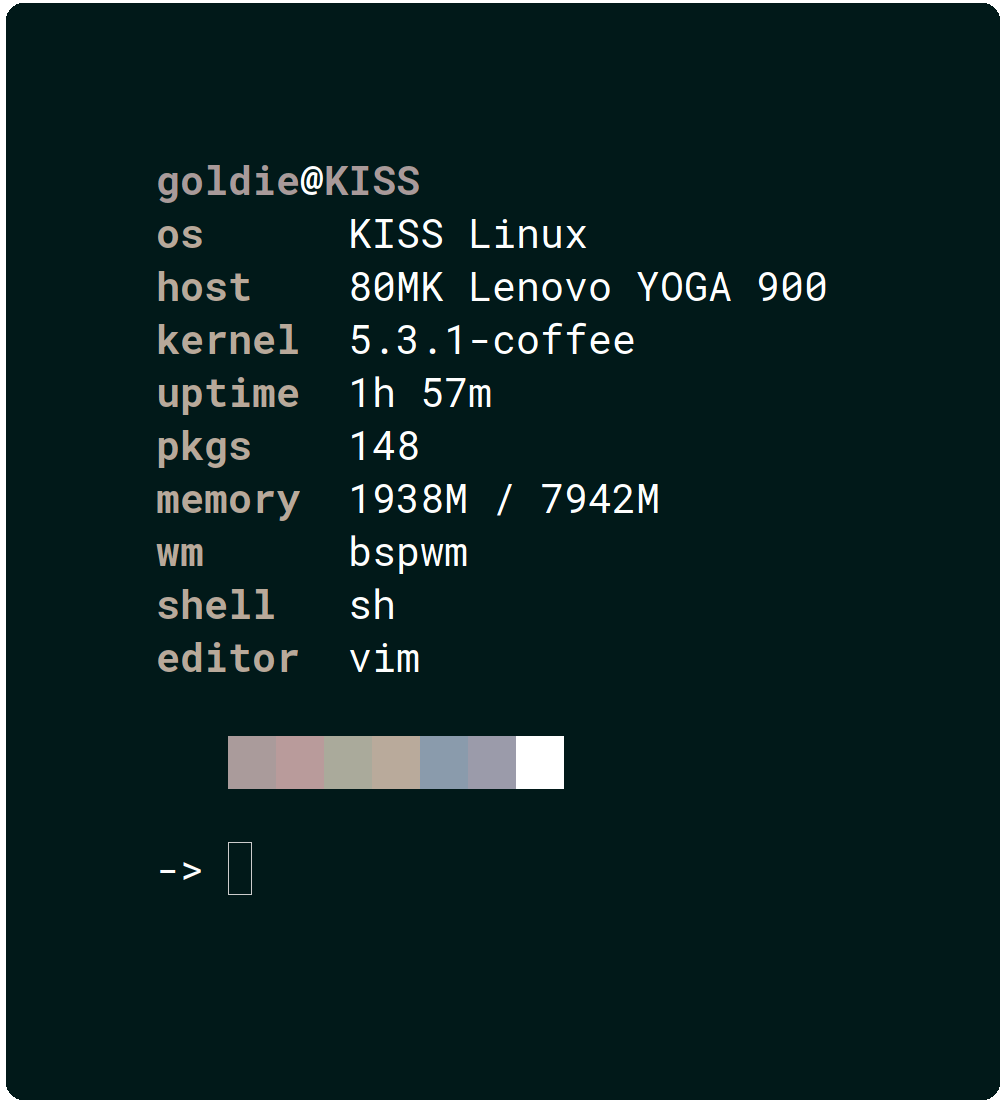Bedrock mimics other distros. Part of doing so involves having distro
identifiers such as /etc/os-release look like those from other distros.
It must thus be special cased to be detected properly.
Bedrock typically includes /bedrock/cross/* entries in its $PATH.
However, they may be dropped as a hint to Bedrock-aware software that
they should act as though they were not Bedrock aware. The $PATH check
is thus used to have pfetch conditionally disable the Bedrock special
casing even on Bedrock systems.
pfetch package count detection fails to consider repeated instances of a
given package manager. Correcting this for the Bedrock specific concern
is purposefully eschewed for the sake of simplicity. It may be
revisited later once Bedrock's Package Manager Manager ("pmm") feature
stabilizes.

pfetch
A pretty system information tool written in POSIX sh

The goal of this project is to implement a simple system
information tool in POSIX sh using features built into
the language itself (where possible).
The source code is highly documented and I hope it will
act as a learning resource for POSIX sh and simple
information detection across various different operating
systems.
If anything in the source code is unclear or is lacking in its explanation, open an issue. Sometimes you get too close to something and you fail to see the "bigger picture"!
OS support
- Linux
- Alpine Linux, Arch Linux, Arco Linux, Artix Linux, CentOS, Debian, Elementary, Fedora, Gentoo, Guix, Hyperbola, KISS Linux, Linux Lite, Linux Mint, Mageia, Manjaro, MX Linux, NixOS, OpenSUSE, Parabola, Pop!_OS, PureOS, Slackware, Ubuntu and Void Linux.
- All other distributions are supported with a generic penguin logo.
- Android
- BSD
- DragonflyBSD, FreeBSD, NetBSD and OpenBSD.
- Windows
- Windows subsystem for Linux.
- Haiku
- MacOS
- Minix
- Solaris
Configuration
pfetch is configured through environment variables.
# Which information to display.
# NOTE: If 'ascii' will be used, it must come first.
# Default: first example below
# Valid: space separated string
#
# OFF by default: shell editor wm de palette
PF_INFO="ascii title os host kernel uptime pkgs memory"
# Example: Only ASCII.
PF_INFO="ascii"
# Example: Only Information.
PF_INFO="title os host kernel uptime pkgs memory"
# A file to source before running pfetch.
# Default: unset
# Valid: A shell script
PF_SOURCE=""
# Separator between info name and info data.
# Default: unset
# Valid: string
PF_SEP=":"
# Color of info names:
# Default: unset (auto)
# Valid: 0-9
PF_COL1=4
# Color of info data:
# Default: unset (auto)
# Valid: 0-9
PF_COL2=7
# Color of title data:
# Default: unset (auto)
# Valid: 0-9
PF_COL3=1
# Alignment padding.
# Default: unset (auto)
# Valid: int
PF_ALIGN=""
# Which ascii art to use.
# Default: unset (auto)
# Valid: string
PF_ASCII="openbsd"
# The below environment variables control more
# than just 'pfetch' and can be passed using
# 'HOSTNAME=cool_pc pfetch' to restrict their
# usage solely to 'pfetch'.
# Which user to display.
USER=""
# Which hostname to display.
HOSTNAME=""
# Which editor to display.
EDITOR=""
# Which shell to display.
SHELL=""
# Which desktop environment to display.
XDG_CURRENT_DESKTOP=""
Credit
- ufetch: Lots of ASCII logos.
- Contrary to the belief of a certain youtuber,
pfetchshares zero code withufetch. Only some of the ASCII logos were used.
- Contrary to the belief of a certain youtuber,
Description
Languages
Shell
99.7%
Makefile
0.3%